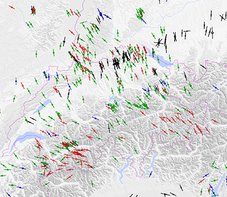Crustal stress state


Background
Characterizing the crustal stress field is essential for understanding both global and local geodynamic processes. On a large scale, it provides insights into plate tectonics and earthquake mechanics, while on a local scale, it is crucial for the safe utilization of the subsurface, such as managing geothermal reservoirs or deep geological repositories for nuclear waste. The present-day stress state also significantly impacts wellbore stability and trajectory optimization, helping to mitigate risks and improve drilling operations. Furthermore, understanding regional and local stress fields is vital for developing physics-based seismic hazard assessments and establishing mitigation strategies for induced seismic activity.
Due to the limited, clustered, and often incomplete nature of stress field data, 4D geomechanical-numerical modeling plays a key role in describing the contemporary undisturbed stress field and predicting its evolution due to natural and human-induced processes. In this research domain, Section 2.6 provides a unique global database based on internationally recognized quality-ranking schemes. This allows the integration of different data sources, ranging from local borehole measurements at the meter scale to earthquake focal mechanism data that provide stress insights at crustal scale. Additionally, we develop a modelling framework that describe the stress field in 3D and its changes over time with quantified uncertainties.
Scientific key questions
- What are the key driver of the stress field variability on spatial different scales from borehole to crustal scale?
- How can we quantify the model uncertainties that predict the crustal stress field?
- How can we improve the models for stress field predictions using indirect data and machine learning techniques?
- Which role has the initial stress in the onset and control of induced seismicity?
Related projects
- WSM | World Stress Map
- SQuaRe | Stress predictions QUAntification and REduction of uncertainties with geomechanical-numerical subsurface models
- SpannEnD | Stress field for nuclear waste disposal site selection in Germany
- GoEffective | Geomechanical assessment and well design for geothermal sites based on effective stress
- World Pressure Map
Data, Products, Services
- CASMO
WSM Database